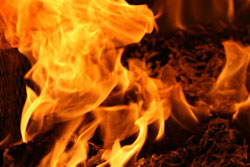| |
Ahaziah . . .
sent messengers, saying to them, "Go and consult
Baal-Zebub, the god of Ekron, to see if I will
recover from this injury." But the angel of the
Lord said to Elijah the Tishbite, "Go up and
meet the messengers of the king of Samaria and
ask them, ‘Is it because there is no God in
Israel that you are going off to consult Baal-Zebub,
the god of Ekron?’ Therefore, this is what the
Lord says: ‘You will not leave the bed you are
lying on. You will certainly die!’" So Elijah
went. (2 Kings 1:2-4) |
|
Ahab was dead. His son,
Ahaziah, had been crowned in his place, and the kingdom
of Moab seized its chance to revolt against Israel.
Ahaziah did nothing to put the rebellion down, for, like
Belshazzar, he was intent only on his personal
pleasures. Ahaziah had learnt nothing from God’s
dealings with his father, but displayed all the worst
excesses of both his parents.
One day, Ahaziah was leaning over the balustrade of his
upper room when it collapsed. So severe were the
injuries he sustained when he fell, that he turned to
the ancient shrines of Canaan for help and guidance. To
do so was a public denial of the Lord God of Israel.
After all, Baal-Zebub was no more than the Philistine
god of flies and the dung heap – and it was only a few
years since the Baals had been shown on Mount Carmel to
be spectacularly impotent.
Elijah had been God’s messenger to Ahab on three
previous occasions. Now, as he neared the end of his
life, the Lord entrusted him with a message to Ahab’s
offspring. This episode is less well-known than the
confrontation on Mount Carmel, but in its way it was
just as perilous a mission as his original visit to the
royal court had been. The Lord gave gave Elijah the
message that Ahaziah would die on his sick bed because
he had turned from the Lord.
Elijah met the king’s messengers, and they in turn
passed on the Lord’s warning to the king. Instead of
embracing the opportunity to have Elijah as his friend
and adviser, Ahaziah responded by sending fifty of his
crack troops to arrest the prophet. So far as he was
concerned, Elijah was nothing less than a traitor.
Ahaziah’s commandos came across Israel’s senior watchman
sitting on a hill. But they were unable to arrest him!
At this supreme moment of danger, Elijah again turned
his face to heaven and cried out to his Lord. – and just
as the mob which sought to do away with the Lord Jesus
were unable to succeed, so these soldiers found
themselves pitted against the unseen power of Heaven and
inexplicably thwarted,(1)
Ahaziah had chosen to follow the Baals, and the Lord
preserved His servant’s life, and in such a way as to
demonstrate His holiness. The fire, which had previously
fallen from heaven to destroy the sacrificial bull on
Mount Carmel, blazed down once again to incinerate all
fifty of the soldiers.
The Fire Falls a Second Time
‘If I am a man of God, may fire come down from
heaven and consume you and your fifty men!’ Then fire
fell from heaven and consumed the captain and his men.
(2 Kings 1:10)
Ahaziah had chosen to follow the Baals, and the Lord
preserved His servant’s life, and in such a way as again
demonstrated His holiness. The fire, which had
previously fallen from heaven to destroy the sacrificial
bull on Mount Carmel, blazed down again to incinerate
all fifty of the soldiers.
We can see so much of Jezebel, in the way Ahaziah
handled this crisis. Rather than repenting in the face
of so great a miracle, he rejected the word he had been
sent and attacked the person who gave it. (There are
many who do the same today). Convinced that might was
right, the king sent out a second force of fifty men –
who met an equally sudden, fiery end. |

|
We may safely presume that the third contingent of
soldiers would have fared no better, had not the captain
prudently thrown himself on Elijah’s mercy. Here is a
word that both touches and sums up God’s heart. Studying
the theme of mercy in a concordance is rather like
looking up ‘Smith’ or ‘Brown’ in an English telephone
directory!
As Peter would one day receive unexpected guidance to
venture into the house of a Gentile centurion, so now
the Spirit of God bade Elijah not to be afraid of this
captain, but to follow him.(2) The Lord was with His
prophet as he made one last visit to the royal palace.
Elijah delivered a final, uncompromising message to the
king. Because Ahaziah had acted as though there was no
God in Israel, and had turned instead to foreign gods,
he would surely die. And so it turned out to be. Barely
two years into his undistinguished reign, Ahaziah died,
unmourned by all.
The Pagan Challenge

freefoto.com |
What, then, are we to make of these two examples
of fire from heaven destroying those who opposed
the work of God?
We know, from the standpoint of life beyond the
Cross, that we are called to bless our
enemies, rather than to call down fire on them –
but we are also called to resist evil.(3)
The Prayer Book uses strong language in its
prayers against the work of evil men. For
example: ‘Abate their pride; Assuage their
malice and confound their devices.’
We may not often hear such language today, yet
there are times when the proper prayer should
undoubtedly be less, ‘O Lord bless so and so,’
so much as ‘O Lord, confound Ahithophel and turn
his counsel into foolishness.’(4)
These are the moments when we are called to
exercise the authority of the Lord into
situations that would otherwise remain locked in
the grip of enemy forces. This is a weighty
work, and one that needs to be done carefully
and corporately. |
We may certainly feel
sorry for the unfortunate soldiers (who were, after all,
doing no more than following their orders) but it is
also important to remember the threat that Ahaziah
posed. Nothing less than the cause of God was at stake
in the life of the nation. Elijah was not only in
imminent danger of being put to death, he was also
caught up in intensive spiritual warfare against a
monarch who looked set to continue the worst excesses of
the previous regime.
We can never afford to forget that our battle is with
the unseen powers of darkness, and not with flesh and
blood. Elijah’s mission was to call the people back to
the living God, and to show them that the vile Baals had
nothing in common with Him. How relevant this is to our
own generation! After all, if God were no different, or
no greater than Baal, and all religions were equally as
capable of leading us to God, then the Lord Jesus need
never have died on the Cross.
The uncertainties of our own age, coupled with man’s
propensity to seek for hidden knowledge, explain in part
why over sixty percent of all women in Great Britain
regularly read their horoscopes. The popularity of
occult activities such as palmistry, spiritualism, tarot
cards, ouija boards, paganism, yoga and TM is self
evident. Such things correspond in many ways to the
ancient shrines of Canaan. But why do people turn to
these deceptive powers of darkness, when all we need to
know about the future is to be found in the Bible?(5)
We have seen how God specifically commissioned Elijah to
challenge Ahab about the murder of Naboth.(6) There
comes a time when it is unacceptable to remain silent.
Intimacy with God does not mean shrinking from
confrontation – but we do need God’s wisdom in knowing
how to help people who have become involved in pursuits
that will lead their soul astray.
|
|

